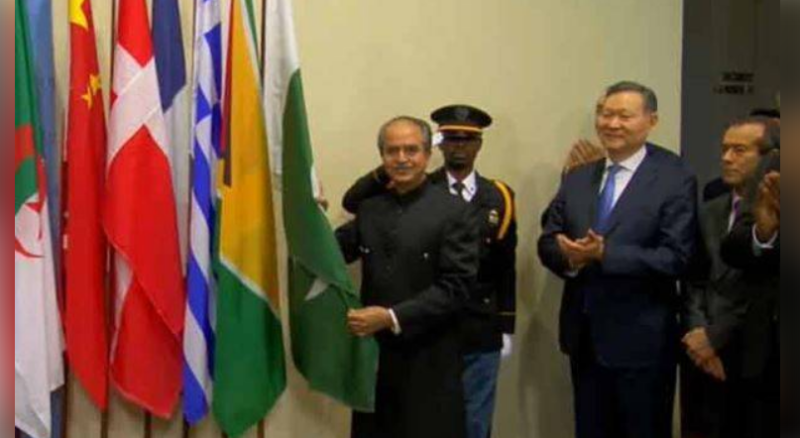New York (Web Desk/Agencies): Pakistan's national flag was proudly raised in front of the United Nations Security Council (UNSC) chamber at the UN Headquarters in New York, marking the beginning of the country's 8th term as a non-permanent member of the Council for the 2025-26 period.
The occasion saw the flags of the five newly elected non-permanent members—Pakistan, alongside Denmark, Greece, Panama, and Somalia—being installed at the UNSC stakeout.
This ceremony followed the conclusion of the terms for the outgoing members: Japan, Ecuador, Malta, Mozambique, and Switzerland, whose service ended on December 31, 2024.
The flag installation was conducted by Pakistan's Alternate Permanent Representative to the UN Asim Iftikhar Ahmad.
In his remarks, Ambassador Asim emphasized that Pakistan would continue to adhere to the core principles of the United Nations Charter, including the maintenance of international peace and security and fostering amicable relations between nations based on equal rights and self-determination.
He affirmed that Pakistan would remain a steadfast advocate for the rights of peoples under foreign occupation and oppression, striving for their right to self-determination.
Ambassador Ahmad underscored Pakistan's commitment to cooperative multilateralism, with the UN playing a central role in addressing the complex challenges facing the international community today.
He stressed the importance of tackling the root causes of both long-standing and emerging conflicts, advocating for dialogue and diplomacy as the primary means to reduce tensions, halt the arms race, and create a conducive environment for peace, stability, and development.
Pakistan, he noted, would work in close partnership with other Council members to actively seek just and peaceful resolutions to the issues under discussion.
The country would also aim to maximize the use of various tools at its disposal—from conflict prevention to peacekeeping and peacebuilding—in pursuit of durable peace.
The envoy highlighted that success would lie in upholding the UN Charter and international law in all circumstances and ensuring the effective implementation of the Security Council's resolutions.
Reflecting on Pakistan’s responsibilities, Ambassador Asim Ahmad reaffirmed the country's deep commitment to those suffering in conflict zones worldwide.
He assured that Pakistan would approach its term with determination and resolve to contribute meaningfully to the collective goal of building a more peaceful and secure world.
Pakistan will preside over the 15-member Council in July when it assumes its presidency according to alphabetical rotation of the member states’ official names. This will allow Islamabad to set the Security Council’s agenda.
In addition to this, Pakistan will get a seat on the Islamic State (ISIS) and Al Qaeda Sanctions Committee, which is responsible for designating individuals and groups as terrorists and imposing sanctions.
The UNSC, comprising 15 members, is one of the most powerful bodies within the United Nations, responsible for maintaining international peace and security.
While five of its members are permanent—namely, the United States, China, Russia, France, and the United Kingdom—the remaining 10 seats are filled by non-permanent members elected for two-year terms, with five rotating each year.
The flag installation ceremony, a tradition introduced by Kazakhstan in 2018, reflects the deep commitment of the newly elected members to address global peace and security issues.
Kairat Umarov, Kazakhstan’s Permanent Representative to the UN, who presided over the event, expressed confidence that the new members would bring fresh perspectives and a renewed focus to the global challenges at hand.
He highlighted the pressing issues currently facing the international community, including ongoing conflicts, humanitarian crises, and the far-reaching consequences of climate change and the global pandemic.


